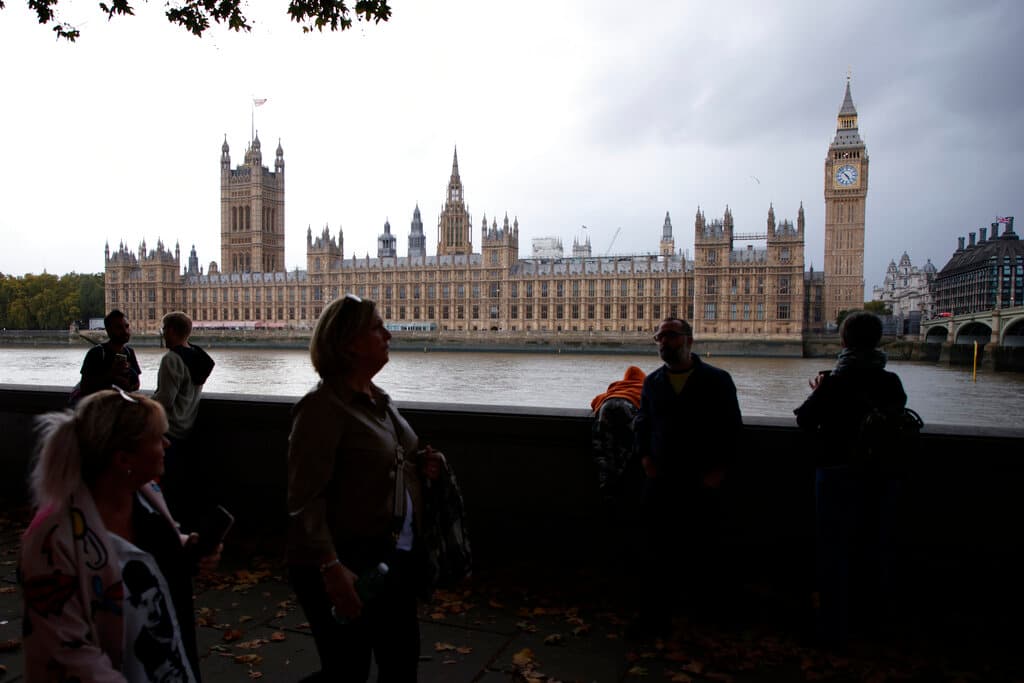To the Frightful Political Crisis in Britain, Our Brexit Diarist Says ‘Boo’
Conservatives are rising in the polls almost as fast as they plummeted.

“I don’t know what effect these men will have on the enemy,” the Duke of Wellington reputedly remarked prior to Waterloo, “but by God, they terrify me.” Such a fright is also afoot in the hallowed halls of Westminster, where a cauldron of trouble is brewing for the major parties, this Hallowe’en.
Two weeks ago, the conventional wisdom was that the serving prime minister, Elizabeth “Liz” Truss, didn’t have a ghost of a chance of leading her party to the end of the month, let alone into the next general election. Those auguries proved accurate. Until this weekend, a similar ill-wind was forecast for her successor, Rishi Sunak.
Recent surveys may prove otherwise, however. At a poll conducted over the weekend by Redfield and Wilton Strategies, the Prime Minister leads Labor’s leader, Sir Keir Starmer, by 4 points, 41 percent to 37 percent. At Opinium Research, the results are similar, with Sunak-Starmer, 31 percent to 27 percent.
Another poll conducted by Opinium Research is no less solemn for the Labor Party. Last week, the Opposition led the Government by 27 points, 50 percent to 23 percent. Now, that lead is nearly halved, with the Conservatives picking up 5 points and Labor dropping 6 — 44 percent to 28 percent.
Granted, that gap has shrunk to a “mere” 16 percent. Nothing to sneeze at, but a remarkable turnaround, considering. More remarkable still, on the question of which party “would be best at handling the economy,” the Conservatives lead Labour 33 percent to 29 percent — a 4 point lead. A frightful fact, in its own right, for Sir Keir.
For consider: During the leadership contest to replace Boris Johnson, it was Ms. Truss’s “tax cuts” for economic growth versus Mr. Sunak’s “highest tax rates” in 70 years. Neither candidate campaigned on the issue of spending retrenchment.
Trussonomics scared the financial markets silly, on the basis that the “unfunded” nature of Government cuts were to be met by increased borrowing. The bond yield responded with ghastly consequences for government borrowing costs — and state pension solvency, in particular.
So “tax cuts” were out, along with the Chancellor of the Exchequer, Kwasi Karteng. In came Jeremy Hunt and a return to Sunak-style tax increases. Soon, Premier Truss was herself to leave office, confronted by implacable opposition from all sides of the Commons.
Mr. Sunak’s reputation as a “safe pair of hands” will soon be tested. With the Government faced with rising interest rates and double-digit inflation, there is some urgency to fill a £50 billion hole in the public finances. So, finally, “spending cuts” are whispered about as next on the agenda.
Which brings us back to the spooky spectacle that Tories are seen (for the moment) as more credible than Labor at handling the economy. This is mind-numbing head-spinning to rival Linda Blair in “The Exorcist.”
What about “maximal liberty and minimal government”? What about tax cuts and cuts to public spending? Not to mention deregulation. To simply contemplate how intrusive the State has become after a decade of Conservative Government will send a cold chill down the spine of all conservative-minded citizens.
At least the short-lived Truss Ministry made a stab at policy that tax cuts lead to economic growth. Greater success may have followed if it had first argued the logic of its case. Nevertheless, the mere idea of reducing the reins of tax-and-regulatory burden made the blood of bureaucrats run cold.
Instead, the blame is laid at the foot of Brexit and the people’s wish for independence from the European Union. Nor should the Conservatives become complacent that the tide has turned. With energy supply and cost-of-living issues still looming large, they enjoy at best a momentary “honeymoon period” blip.
That Conservatives are the authors of their own misfortunes, through misguided ideology concerning Covid and carbon neutral policies, should give them pause. The impatience of voters to go to the polls should give them pause, as well.
Asked whether the installation of a new Prime Minister should trigger a general election, a R & W Strategies survey shows that 64 percent of all respondents agree. Confined to Conservative voters in the 2019 election, the result is 50 percent who agree and 40 percent who don’t.
So the world of United Kingdom politics finds itself if not in a lull, then in limbo — a middling place between the heaven of governance and the hell of opposition. Much depends on which party best offers the electorate a plan for economic recovery. As a winter of discontent approaches, neither party betrays a chance of winning over public confidence. To which we Brexiteers say: “Boo.”
BrexitDiarist@gmail.com

